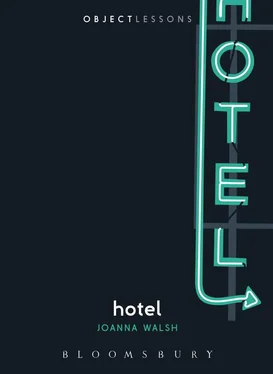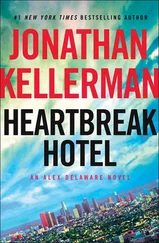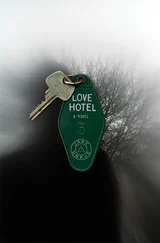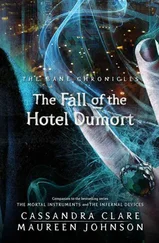Legally I can check out any time, but it’s not easy to leave my desire for it.
Postcard #8—Home times
(This postcard is oriented in landscape and split vertically into two unequal panels. 80 percent of the postcard shows a view of the hotel front, 20 percent shows a man and a woman on skis. They are taller than the hotel.)
If marriage is “from,” home is “to.” Home would be when we had accumulated all its parts. Once we lived in a house where only one room was livable, where the others had holes in the floor, the walls. For a while there was no heating, for a while there was no water. Was that home? Not at that moment, but we were working on it. It didn’t matter that home was not there yet, that we slept on a mattress, cooked in a microwave, that I fed the baby on bare boards. We lived at a low level, sitting on the floor. The other rooms were filled with furniture turned in upon itself. We didn’t seem to need it. The house did not look like home then but it was. Home was in hope. I don’t hope for home any more.
(Is there no place we can be together except the future?)
Postcard #9—Me-time
(This postcard shows the hotel frontage but, in order that it fills the height of the picture, it is cut off at either side.)
I can scarcely begin to say what went on between us. It was so mundane its violence is embarrassing. All I can say is it is not going on now, so I can no longer describe it.
It was to do with self.
It was to do with where I was, myself, which was a problem not only of space but also of time.
It was a problem, like marriage, like home, of prepositions. Who am I for? That’s the question I kept asking. If I’m not for you, who am I for? I knew I shouldn’t want to be for someone: I should be living for art, perhaps. I should be living for myself, or whatever, and, yes, I tried to desire these abstracts.
I have an adhesible yearning, reuseble as blu-tac.
Perhaps I will always be looking for something better.
As soon as I think of a man, I begin to lose myself.
Postcard #10—Bedtime
(This postcard shows a bush that might be in the hotel’s garden. In front of the bush stands a woman in a white dress, one hand on her hip, the other in her hair. She is looking off to the left, away from the hotel’s name, which appears in white cursive lettering on the right.)
FREUD
Since bed and board constitute marriage.
I needed help with the beds. At home, often, the end of the day would come and still not all the beds had been made. Some beds returned to night without their sheets ever having been straightened. This was not the way it should be — but who should do it for them? They couldn’t do it for themselves. They were weak in the head, they were infants, they needed a mother, they needed a nurse, they needed a maid. I did not want to be it, but who else was there so conveniently wearing an apron?
There is something about a mown lawn that is like a made bed. Evidence of work I didn’t have to do. A made bed is my province; a mown lawn is yours. In order to exact work from you, I must do mine. I like the feeling that something has been done for me, even if I dislike the work I must do in exchange. And I must do it every day whereas a lawn must be mown once a fortnight at most, less frequently in winter. But how much I like the smell of new-mown grass, of fresh-washed sheets.
Postcard #11—Home work
(This portrait-oriented postcard is split horizontally, approximately 50/50. The top panel shows the front of the hotel, the bottom a hotel room. The building seems to balance on the curtain rail.)
Some things to do with home cannot be taught, but can only be learned through experience (or, these things never come into words, or else words never come into it). Home is an art, the way that knowing the grain in wood is an art, like knowing how to cut a board to make a bed. The art of most people is home.
Because we both had other arts, it was difficult to pursue the art of home. For most people it is difficult to pursue two difficult things. Usually it is enough for one partner to pursue home. This is usually the woman. The other person, usually the man, can look on approvingly, seeing home is being made, though not by him. This is home work.
Home work is a work done behind closed doors. Unlike cutting a board to make a bed, it leaves no evidence. Time is undone each time the bed is made up. Home work — cleaning, ironing, washing — is undoing.
And, for your part, you liked to look on and approve. On the children, on the animals, with which we filled home, and who required in their turn beds made of board, which was one action, and the continual making and unmaking of those beds, which was another. You liked to see me look after them. You allowed yourself this look, no doubt with the best intentions, with the intention of looking on my home work approvingly. If I didn’t do the home work right your look changed. You could hardly help yourself, but it was awful to be looked on, even when your look was approving. It built a wall between us that did not look like a wall, like the glass wall in a television set; I was inside, you were outside. I was constrained to act, by duty, by sympathy (by love?), constrained by your looking to go on doing. You, perhaps, were constrained by my actions to keep on looking, though your action involved only yourself. I was lonely, demonstrating my prowess at home work, with only the children, the animals for company. My work was looked at, but I could not look at yours — a TV screen is one-way. I’m not sure you were lonely: you always had someone to look at. This is called looking after.
You never know how your wife will work out, so you look after her home work very carefully. You can marry a sensible woman, give her a home, and she will become unreasonable. She might demand a hotel.
Postcard #12—Part-time
(This postcard shows a view onto the hotel pool, from a window that might be in the hotel.)
Since we parted, when I am on my own with my home work, knowing that you are not looking as it is no longer your role to look, I am perfectly content. I could be making a home for myself. If you arrived I would no longer feel at home; I would be on edge. I would think you should look after the work I had done, and, in order to show it to you, I would have to work in a way you might want to look at. If you were at home, but not looking, I would be anxious: that you did not want to look, that you did not want to participate in home even by looking. I needed the looking. If you did not look, it was not work. If it was not work, it had no beginning and no end. If you did not look, my home work had no boundaries.
Watching me, this home-making must have seemed eccentric: an animal building by instinct, from sticks, debris, its own fur and bodily fluids. No one knows why.
No one asked me to do it, did they?
Perhaps.
Postcard #–11—Away
(This postcard is divided into six squares, five of which show ancient monuments, the sixth, the hotel.)
Rewind. I am at home. My soon-to-be-ex husband is away. Like two wooden people on a cuckoo clock, one is in when the other is out. The whole day has been calm. I had forgotten how calm home could be. The more I wriggle toward divorce the more painful I know it will be, the closer I get to the terrible blank pain I felt yesterday when I realized I had persuaded you to leave, calm panic with no prospect of an end. But the more I work my way toward it determinedly, the more triumphant I feel. I do not understand, nor can I predict, what I want. I can trust only the leaving. It must happen. It is happening already.
Читать дальше












